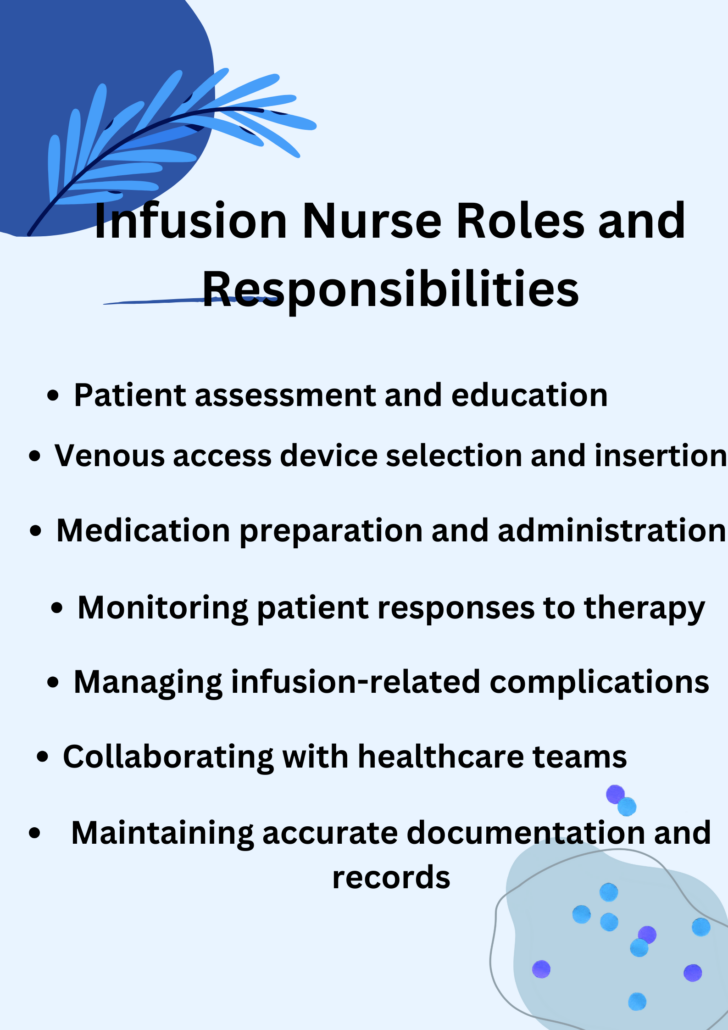Discover the ins and outs of an infusion nurse profession, from the role’s definition and educational requirements to certification, career outlook, and advantages and disadvantages.
Dive deep into the responsibilities, demand, and career growth opportunities, along with a comparison to other advanced nursing roles.

Who is an Infusion Nurse?
An infusion nurse is a skilled healthcare professional who specializes in administering medications and fluids through various routes, including intravenous (IV) lines, central lines, and infusion pumps.
These nurses work closely with patients who require specialized treatments, such as chemotherapy, antibiotics, or hydration therapy. They must possess a keen understanding of pharmacology, patient assessment, and infection control to ensure safe and effective delivery of medications.
How Long Does it Take to Become an Infusion Nurse?
Becoming an infusion nurse typically requires a combination of formal education and hands-on experience.
The journey begins with earning a nursing degree, which can take anywhere from two to four years, depending on the level of education pursued (e.g., associate’s degree in nursing, bachelor of science in nursing).
Following graduation, aspiring nurses often gain experience in general nursing practice before pursuing additional training or certification in infusion therapy. This process can take an additional one to two years, depending on the individual’s career trajectory and educational goals.
What Does an Infusion Nurse Do?
Infusion nurses are responsible for a wide range of duties, including assessing patients’ needs, selecting appropriate venous access devices, preparing and administering medications, monitoring patients during infusion therapy, and educating patients and their families on proper care techniques.
Additionally, they play a crucial role in preventing and managing complications related to infusion therapy, such as infiltration, extravasation, and infection.
How to Become an Infusion Nurse
Individuals must first complete a nursing program and obtain licensure as a registered nurse (RN).
Following this, they can pursue specialized training or certification in infusion therapy through organizations such as the Infusion Nurses Certification Corporation (INCC) or the Oncology Nursing Certification Corporation (ONCC).
These certifications typically require a combination of clinical experience and successful completion of an examination.
Educational Requirements for an Infusion Nurse
Educational requirements typically include a nursing degree from an accredited program, such as an associate’s or bachelor’s degree in nursing. Additionally, many employers prefer or require candidates to have specialized training or certification in infusion therapy.
Infusion Nurse Certification and Exam Requirements
Certification for infusion nursing is available through organizations such as the Infusion Nurses Certification Corporation (INCC) and the Oncology Nursing Certification Corporation (ONCC).
To become certified, nurses must meet eligibility requirements, which often include a minimum number of hours of clinical experience in infusion therapy, and pass a rigorous examination.
Where Does an Infusion Nurse Work?
Infusion nurses can work in a variety of healthcare settings, including hospitals, outpatient infusion centers, ambulatory care facilities, home healthcare agencies, and specialty clinics.
They may also find employment opportunities in long-term care facilities, rehabilitation centers, and physician offices.
What is the Infusion Nurse Career Outlook and Career Growth?
The demand for is expected to grow in response to the aging population and advancements in medical technology.
As healthcare continues to evolve, they may find opportunities for career advancement in leadership roles, research, education, and specialized practice areas.
What are the Qualities of an Infusion Nurse?
Key qualities of successful infusion nurses include strong clinical skills, attention to detail, excellent communication skills, empathy, adaptability, and a commitment to patient safety and advocacy.
Additionally, infusion nurses must be able to work effectively in high-pressure environments and collaborate with interdisciplinary healthcare teams.
Are There Any Online Programs to Become an Infusion Nurse?
Yes, there are online programs available for nurses interested in pursuing specialized training or certification in infusion therapy.
These programs offer flexible learning options, allowing nurses to balance their education with their professional and personal responsibilities.
What is the Salary of an Infusion Nurse?
The salary of an infusion nurse can vary depending on factors such as location, level of experience, and employer.
According to the Bureau of Labor Statistics (BLS), the median annual wage for registered nurses was $75,330 in May 2020.
How Do Infusion Nurses Transition to Other Nursing Positions?
Transition to other nursing positions by pursuing additional education, training, or certification in their desired specialty area.
They may also leverage their clinical experience and skills to explore opportunities for advancement within their current healthcare organization or seek employment in different healthcare settings.
5 Advantages and Disadvantages of Becoming an Infusion Nurse
Advantages:
- Specialized expertise in infusion therapy
- Opportunities for professional growth and advancement
- Fulfilling patient interactions and impact on patient outcomes
- Competitive salaries and benefits
- Versatility in practice settings and patient populations
Disadvantages:
- High levels of responsibility and accountability
- Exposure to potential occupational hazards, such as needlestick injuries and exposure to hazardous medications
- Demanding work schedules, including night shifts and weekends
- Emotional challenges associated with caring for patients with serious illnesses
- Continuous learning and staying updated with advancements in infusion therapy

Infusion Nurse Roles and Responsibilities
- Patient assessment and education
- Venous access device selection and insertion
- Medication preparation and administration
- Monitoring patient responses to therapy
- Managing infusion-related complications
- Collaborating with healthcare teams
- Maintaining accurate documentation and records
What’s the Demand for an Infusion Nurse?
The demand for infusion nurses is expected to remain strong, particularly in settings such as hospitals, outpatient infusion centers, and home healthcare agencies.
Factors driving this demand include an aging population, increasing prevalence of chronic diseases, and advancements in medical technology.
How Does an Infusion Nurse Compare to Other Advanced Nursing Roles?
Infusion nurses differ from other advanced nursing roles, such as nurse practitioners or nurse anesthetists, in terms of their focus on infusion therapy and patient care.
While nurse practitioners and nurse anesthetists may have broader scopes of practice and independent prescriptive authority, they specialize in administering medications and fluids through various routes.
What Are the Nursing Specialty Roles of an Infusion Nurse?
- Oncology nursing: Administering chemotherapy and supportive care medications to cancer patients
- Intravenous therapy nursing: Managing complex infusion regimens for patients with acute and chronic illnesses
- Home infusion nursing: Providing infusion therapy in patients’ homes, ensuring continuity of care and patient comfort
Conclusion:
In conclusion, infusion nursing offers a rewarding career path for nurses seeking specialized expertise in infusion therapy and patient care. With opportunities for professional growth, competitive salaries, and a high demand for skilled practitioners, infusion nursing remains a vital component of modern healthcare delivery. As the healthcare landscape continues to evolve, infusion nurses will continue to play a pivotal role in ensuring safe and effective infusion therapy for patients across various settings.
Frequently Asked Questions
- What does infusion nurse mean? An infusion nurse is a registered nurse (RN) who specializes in administering medications, fluids, blood, and other therapeutic treatments directly into a patient’s bloodstream. This specialized nursing role requires expertise in venous access, medication administration, and patient monitoring to ensure safe and effective delivery of infusion therapy.
- What is the nurse’s responsibility of infusion? The nurse’s responsibility in infusion therapy encompasses a range of crucial tasks, including assessing the patient’s venous access needs, selecting appropriate infusion devices, preparing and administering medications and fluids, monitoring the patient’s response to therapy, managing infusion-related complications, and providing patient education and support throughout the treatment process. Additionally, infusion nurses must adhere to strict protocols for infection control, medication safety, and documentation to ensure optimal patient outcomes.
- What does infusion nurse do? An infusion nurse performs a variety of duties related to infusion therapy, including:
- Assessing the patient’s medical history and current condition to determine the need for infusion therapy.
- Selecting and inserting appropriate venous access devices, such as peripheral catheters, central venous catheters, or implanted ports.
- Preparing and administering prescribed medications, fluids, blood products, or nutritional supplements via infusion pumps or gravity flow.
- Monitoring the patient’s vital signs, infusion site, and overall response to therapy, adjusting treatment parameters as needed.
- Educating patients and their caregivers on the proper care and maintenance of infusion devices, potential side effects of medications, and signs of complications to watch for at home.
- Collaborating with other healthcare professionals, such as physicians, pharmacists, and nurse practitioners, to coordinate patient care and ensure treatment goals are met.
- What is the role of infusion nurse? The role of an infusion nurse is multifaceted and essential in delivering safe and effective infusion therapy to patients. Key responsibilities include:
- Providing skilled nursing care and support to patients undergoing infusion therapy, including those with chronic illnesses, cancer, infectious diseases, or undergoing surgery.
- Ensuring accurate and timely administration of prescribed medications and fluids, following established protocols and safety guidelines.
- Monitoring patients closely during infusion therapy to detect and manage any adverse reactions or complications, such as allergic reactions, infiltration, or infection.
- Maintaining a sterile environment and adhering to infection control practices to minimize the risk of contamination and nosocomial infections.
- Educating patients and their families about the purpose of infusion therapy, potential side effects, self-care techniques, and the importance of adherence to treatment plans.
- Collaborating with interdisciplinary healthcare teams to develop comprehensive care plans, evaluate patient progress, and make necessary adjustments to treatment regimens based on individual needs and responses.
Top of Form

